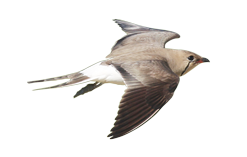Greater Flamingo population dynamics
Objectives
The aim of this project is to identify the mechanisms that affect the dynamics of the Greater Flamingo, throughout the Mediterranean and West Africa, which is most of its range. We are particularly interested in the causes of individual variations in dispersion or migration, as well as the effects of global changes on this flagship species found in Mediterranean wetlands.
Actions and methodology
This project is based on a long-term study initiated in 1977 by Alan Johnson. Every summer, almost a thousand Greater Flamingo chicks born in the Camargue are ringed by the Tour du Valat just before they take flight, using remote-readable PVC rings. This ringing programme has now been integrated into the International Network for the study and conservation of the Greater Flamingo.
The Tour du Valat now has from a database that is unique in its field, which in 2017 contained nearly 700,000 sightings of more than 60,000 flamingos ringed in the Mediterranean. We combine demographic, genetic, parasitological, and ecotoxicological approaches to understand how local and global factors affect the breeding and survival of the Greater Flamingo.
Results
Thanks to the actions undertaken by the Tour du Valat since as far back as the 1970s, the Camargue has once again become a major nesting site for the species at the scale of its Mediterranean range. The main results of the work carried out on the species are summarised in the Sciences & Management thematic brochure (in French), which can be downloaded free of charge in the “Find out more” section below.
You can support this programme by adopting a Flamingo (click here).
Team
- Project leader: Jocelyn Champagnon
- Staff involved: Antoine Arnaud, Christophe Germain and Arnaud Béchet
- Date of project: Since 1977
Partners
Technical Partners
- CNRS – Centre d’écologie fonctionnelle et évolutive (CEFE) Montpellier
- Laboratoire Biogéoscience – Université de Bourgogne
Financial Partners
Latest publications
Brochures and books
- Béchet A., Thibault M., Boutron O. 2017. Les flamants roses en Camargue. Tour du Valat. Arles: Tour du Valat.
- Béchet A., Cézilly F., Johnson A. 2008. Les ailes pourpres : Le mystère des flamants. Editions du Chêne.
- Johnson A.R., Cézilly F. 2007. The Greater Flamingo. T & AD Poyser.
Scientific papers
- Borghesi F., Enrico D., Migani F., Arnaud B., Rendón-Martos M., Amat J.A., Sommer S., Gillingham M.A. 2017. Assessing environmental pollution in birds: a new methodological approach for interpreting bioaccumulation of trace elements in feather shafts using geochemical sediment data. Methods in Ecology and Evolution 8:96–108.
- Perrot C., Béchet A., Hanzen C., Arnaud A., Pradel R., Cézilly F. 2016. Sexual display complexity varies non-linearly with age and predicts breeding status in greater flamingos. Scientific Reports 6:36242. doi: 10.1038/srep36242
- Balkız Ö., Onmuş O., Sıkı M., Döndürenc Ö., Gül O., Arnaud A., Germain C., İsfendiyaroğlu S., Özbek M., Çağlayan E., Araç N., Parmak B., Özesmi U., Béchet A. 2015. Turkey as a crossroad for Greater Flamingos Phoenicopterus roseus: evidence from population trends and ring-resightings (Aves: Phoenicopteridae). Zoology in the Middle East:1–14.
- Deville A.-S., Labaude S., Robin J.-P., Béchet A., Gauthier-Clerc M., Porter W., Fitzpatrick M., Mathewson P., Grémillet D. 2014. Impacts of extreme climatic events on the energetics of long-lived vertebrates: the case of the greater flamingo facing cold spells in the Camargue. The Journal of Experimental Biology 217:3700–3707. doi: 10.1242/jeb.106344
- Yohannes E., Arnaud A., Béchet A. 2014. Tracking variations in wetland use by breeding flamingos using stable isotope signatures of feather and blood. Estuarine, Coastal and Shelf Science 136:11–18.
- Ernoul L., Mesléard F., Gaubert P., Béchet A. 2014. Limits to agri-environmental schemes uptake to mitigate human–wildlife conflict: lessons learned from Flamingos in the Camargue, southern France. International Journal of Agricultural Sustainability 12:23–36. doi: DOI:10.1080/14735903.2013.798897
- Deville A.S., Gremillet D., Gauthier-Clerc M., Guillemain M., Von Houwald F., Gardelli B., Bechet A. 2013. Non-linear feeding functional responses in the Greater Flamingo (Phoenicopterus roseus) predict immediate negative impact of wetland degradation on this flagship species. Ecology and Evolution 3:1413–1425.
- Béchet A., Rendón-Martos M., Rendón M.A., Amat J.A., Johnson A.R., Gauthier-Clerc M. 2012. Global economy interacts with climate change to jeopardize species conservation : a case study in the Greater flamingo in the Mediterranean and West Africa. Environmental Conservation.39:1–3.
- Pradel R., Choquet R., Béchet A. 2012. Breeding Experience Might Be a Major Determinant of Breeding Probability in Long-Lived Species: The Case of the Greater Flamingo. PLoS ONE 7:e51016. doi: 10.1371/journal.pone.0051016
- Sanz-Aguilar A., Béchet A., Germain C., Johnson A.R., Pradel R. 2012. To leave or not to leave: survival tradeoffs between different migratory strategies in the Greater Flamingo. Journal of Animal Ecology Early view. doi: 10.1111/j.1365-2656.2012.01997.x



